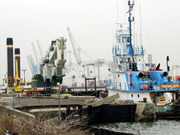In a move to increase security along the state’s waterfronts, Acting Gov. Richard J. Codey signed an agreement on Dec. 16 that would give enforcement power to the state police in Coast Guard Homeland Security zones.
This comes a few months after Democratic Vice Presidential Candidate John Edwards appeared at Bayonne’s former Military Ocean Terminal to highlight some of the security concerns in the ports. The agreements Codey signed will provide another level of security for areas deemed as potential risk.
New Jersey is considered on the front lines in the war on terror because it is part of one of America’s largest ports, and has the largest statewide mass transit system, an international airport, one of the largest financial centers outside of New York City, the fifth largest oil refineries in the nation and a large concentration of chemical and pharmaceutical plants. In Bayonne, the IMTT company has huge chemical storage facilities, and has frequently worked with the Coast Guard in training staff in regards to safety issues.
In a reaction to security issues, the Coast Guard has established several Homeland Security zones with the regions of the Port of New York and New Jersey, one of which is the Global Marine Terminal in Bayonne. But because of severe budget constraints, the Coast Guard has not been able to patrol the various zones regularly. Under agreements signed by Codey, the state police will be able to provide patrols for such areas, including those in Bayonne.
The Coast Guard in New Jersey began cutting back on operations throughout the state at end of 1996 because of decreasing revenue from federal government. Patrols on many rivers such as the Hackensack River ceased in 2000 and have not be fully restored despite the events on Sept. 11, 2001, and the security issues raised in the aftermath of the attacks.
Prior to Codey’s signing of the agreements on Dec. 16, the state police did not have the power to stop, arrest or issue citations to boaters violating security zones. Instead, the state police would have to call the Coast Guard and wait until a Coast Guard unit was available to respond.
“New Jersey is at the forefront on Homeland Security,” Codey said. “We’ve invested more than $300 million in state-funded security efforts. We are a national leader in bioterrorism preparedness, and we’re working with the private sector to safeguard critical industrial sites.”
Help with Homeland Security
Codey called this move to give the state police enforcement powers in homeland Security zones “another milestone” in keeping New Jersey safe.
“Our state police have been designated by the Coast Guard to patrol and enforce the Coast’s Guard’s Homeland Security zones,” he said. “New Jersey is only the second state that has received this designation. It is a testament to our own efforts on homeland security and the great training and professionalism of our state police.”
This change of operation comes as the result of two agreements signed by Codey at a ceremony held in Liberty State Park.
“We’re working across traditional agency boundaries to make America strong in the maritime domain,” said Coast Guard Vice Admiral Vivien Crea, commander of the Coast Guard’s Atlantic Area. “As lead agency for Maritime Homeland Security, we must rely on our law enforcement partners at the federal, state and local level to ensure the safety of American people. Working together like this just makes sense.”
In an effort to meet some of the concerns Edwards raised in the campaign regarding the vulnerability of the state’s ports, Codey has called on the federal government to increase funding to the federal fiscal 2005 budget, noting that only $46 million has been budgeted nationwide in the federal budget for port security – far less than the $400 million estimated needed to provide for secure ports.
“Our efforts do not stop here,” Codey said. “We must keep fighting for the federal government’s support and funding to make our ports and region safer.”
Nancy Kist of the Bayonne Local Redevelopment Authority said the U.S. Coast Guard still operates units out of the former Military Ocean Terminal in Bayonne. She said she was not yet aware of when the state police would pick up duties here.
New boats will aid patrols
To help in the effort to support the Coast Guard, Codey, joined by U.S. Senator Jon Corzine, said three new state police patrol boats will be added to the Marine Unit. The boats will be named after three state troopers who died in the line of duty.
“We are able to live our lives in safety and security thanks to those who put their lives on the line every day,” Codey said. “These boats are another line of defense against a potential attack, and ultimately, they will keep our citizens safer.”
Corzine secured $2.25 million in funding for the boats through the omnibus appropriations bill that Congress approved in the fiscal year 2003.
“New Jersey’s first responders, including our state police, face emergencies and danger without hesitation,” Corzine said. “It is our duty as elected officials to support their work by making sure they have the best available equipment to do their jobs.”
The 44-foot aluminum-hulled patrol boats travel at speeds up to 35 knots and are equipped with the latest underwater and above water surveillance technology, including radar, sonar, thermal imaging cameras, underwater cameras and night vision goggles. Two of the boats will be assigned to the Newark Bay station to patrol the ports and facilities in and around Bayonne, Hudson County and New York City.
